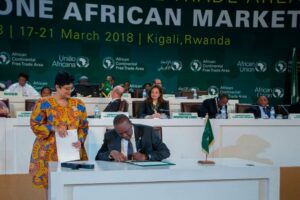
Examining Tanzania’s Protectionism: Implications for Economic Integration in AfCFTA
Many African countries, including Tanzania, have historically implemented protectionist policies to safeguard domestic industries from foreign competition and foster the growth of emerging industries. These protectionist measures can be driven by political or strategic considerations, aimed at ensuring national security and self-sufficiency in specific sectors. Some protectionist scholars argue against extensive trade liberalization for developing economies, advocating for strategies that prioritize shielding infant industries through tariffs and non-tariff barriers to trade. In Tanzania, for instance, there are limitations on foreign investment in certain sectors, such as media, where foreign investors are restricted to owning less than 50% of print media companies, as stated in the Media Services Regulation, 2017.
The African Continental Free Trade Area (AfCFTA), is a historic initiative to promote economic integration and reduce trade barriers among African countries. It aims to create a single market for goods and services across the continent, covering a population of over 1.3 billion people and a combined GDP of more than $3.4 trillion. With the establishment of AfCFTA, some countries may need to reevaluate their protectionist measures and trade barriers to fully benefit from the potential gains of the continental free trade agreement.
A study focused on sunflower oil protectionism, highlighted that tariffs intended to promote locally produced sunflower oil did not have a substantial impact on stimulating demand. Tanzanian households showed little responsiveness to changes in relative prices between imported and locally produced oil, suggesting that tariffs alone might not be sufficient to alter consumption patterns effectively. This underscores the need for a comprehensive approach to trade policies within the context of AfCFTA, as countries may need to reassess their protectionist practices to fully embrace the principles of free trade and regional economic integration.

The Challenges of Protectionism in exploiting the AfCFTA potentials
One of the primary objectives of AfCFTA is to combat protectionism among African nations. Although protectionist policies may offer temporary benefits to certain industries, they often result in reduced overall economic efficiency and slower long-term growth. For instance, in the media industry, low-quality content production has been observed, making it unsuitable for international competition.
The issue of protecting the domestic market or investors takes away the element of competition, which hinders producers from improving their products. For example, when the market is guaranteed, producers may have no incentive to enhance the quality of their products. However, if there are no trade barriers, domestic producers would be compelled to invest more and produce higher-quality products to compete in the market. The same applies to investors; a protected domestic investor may not seek additional funds to increase investments, which are essential for improving the quality of goods and services. Consequently, this lack of improvement may render them unsuitable for the international market.
Following that, people do not always compromise quality for the origin of the product. This always makes the black market more preferred. As manifested during the implementation of Ujamaa in Tanzania, which made severe negative economic impacts, the government has had to use more resources to fight against the black market. Similarly, the same thing may happen in this era if we still cling to implementing protectionism policy.
The AfCFTA represents a significant step towards reducing protectionism in Africa and fostering regional economic integration. By embracing the principles of free trade, member countries can tap into their vast economic potential, promote sustainable growth, and lift millions of people out of poverty. Through cooperation and commitment to the goals of the agreement, African nations can collectively work towards a more prosperous and interconnected future.
The bright spots
Protecting domestic investors seems not to be an issue in some sectors. For example, certain sectors, like mining and telecommunications, have been well exploited by foreign investors. Recently, Tanzania has been facing an ongoing saga involving DP-World, a foreign investor expected to develop and improve the performance of sea and lake ports in the country. The reason given for this investment is the failure of the previous domestic investor.
Given the reason provided by the state to contract with DP-World, a similar rationale is valid for other sectors experiencing low-quality goods or services. For example, TANESCO and Water Authorities. However, this does not necessarily mean that every industry should have an external investor to come and improve the services. Instead, trade barriers should be removed to allow investors to challenge existing investors who might have monopolized the market. This move would not only be beneficial domestically by creating more opportunities but also internationally, positioning us to have our goods and services leading in the international market, particularly within the framework of AfCFTA where the market is guaranteed by the agreement. Foreign investors, despite the fact that they bring capital, technology, employment, increase government revenue, and promote economic growth, still face obstacles rather than facilitation from the Government and citizens.
“Through cooperation and commitment to the goals of the agreement, African nations can collectively work towards a more prosperous and interconnected future.”
In conclusion, protectionist policies do not yield significant results in stimulating local demand or improving product quality. As the African Continental Free Trade Area (AfCFTA) represents a pivotal initiative to promote economic integration and reduce trade barriers among African nations, it calls for the necessity for countries to remove protectionist policies to benefit the long-term interests of the African Market.
To fully exploit the potential of the AfCFTA and ensure sustainable economic growth, African countries must strike a balance between protecting domestic interests and embracing the principles of free trade. Removing trade barriers and fostering healthy competition can incentivize domestic investors and producers to innovate, improve their offerings, and compete successfully in the international market.



